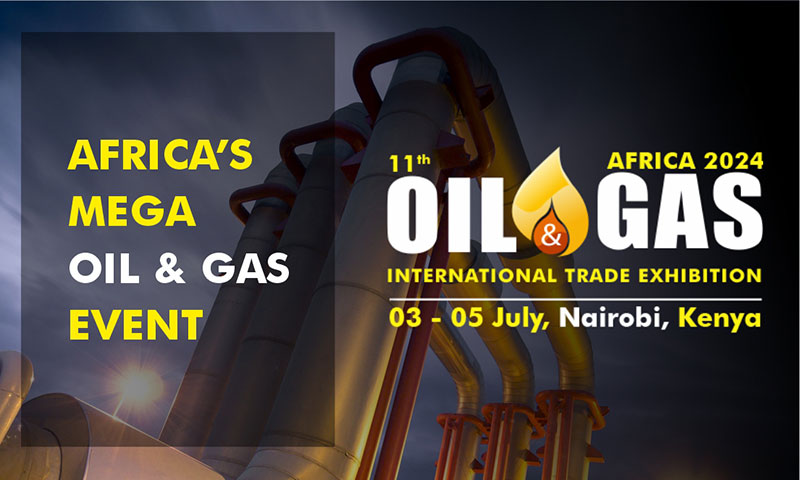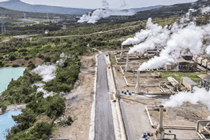

Kenya Plans to Switch Oil Plants to Lng as Part 0f a Climate-Friendly Grid Initiative

Posted on :Wednesday , 10th November 2021
Kenya wants to remove or convert heavy fuel oil-fired power facilities to liquefied natural gas by 2030 as part of its transition to a climate-friendly electricity infrastructure.
According to Isaac Kiva, renewable energy secretary at the Energy Ministry, the state-owned Kenya Electricity Generating Co., or KenGen, is conducting a feasibility assessment on reconfiguring the thermal power facilities that now account for roughly 7% of the system load. The move is part of the East African country's goal of being carbon-neutral by 2050.
“We won’t be using heavy fuel oil anymore,†Kiva said in an interview. “The idea is that those thermal power plants (with contracts) going beyond 2030 will be converted to use LNG.â€
The plan aims to cement Kenya's status as a clean energy leader, with 90 percent of the country's grid currently renewable, and is in line with President Uhuru Kenyatta's demand for investment in an expensive technology-based sector. Despite contributing less than 5% of global greenhouse gas emissions, Africa has borne the brunt of climate change, and efforts to adjust have been hampered by a lack of finance.
As the continent’s geothermal leader, Kenya produces more than 40% of the electricity on its national network from the underground steam. Hydropower contributes a quarter of the power on the grid, while wind sources account for almost 22% and solar 1.3%, according to a September report by the Energy and Petroleum Regulatory Authority, or EPRA.
The Globeleq and Aga Khan Fund for Economic Development-backed Tsavo Power Co. disconnected its 74-megawatt thermal plant from the grid last month. The government decided not to review its 20-year power purchase agreement after it expired in September, Tsavo Power Chief Executive Officer Julius Riungu said. Another 56-megawatt thermal plant owed by Iberafrica Power, a unit of A.P. Moller Holding, was decommissioned in October 2019.
The remaining thermal plants, converted to use LNG, will be tapped when demand peaks and to provide the so-called voltage support, said Joseph Oketch, a director in charge of electricity at EPRA.
Some thermal plants were designed to use heavy fuel oil and LNG, making it easy to switch, according to Kiva. Kenya expects to get gas from Tanzania once a planned pipeline is built.
Meanwhile, the government is increasing renewable energy production and is on track to add at least 300 megawatts of clean energy to the grid by the end of December, according to the energy regulator. By the end of 2026, KenGen wants to add more than 730 megawatts of geothermal power, or double the amount of electricity it generates from subsurface steam.
A Globeleq-backed 40-megawatt solar plant in Malindi, about 104 kilometers (65 miles) north of the port city of Mombasa, may be connected to homes and factories in December, according to EPRA Director-General Daniel Kiptoo.
Two solar farms financed by European Investment Bank and the Hague-based lender FMO, able to generate 40 megawatts each, were added to the grid this year, Kiptoo said. Actis LLP’s 100-megawatt wind farm, backed by Development Finance Corp, was also connected.
While Kenya targets net-zero emissions in under three decades, it faces a test from emerging concerns over the risk of energy-price spikes due to the over-reliance on renewables, as seen in parts of Europe. The government is yet to publicly say if it will completely drop a planned 1,000-megawatt coal-power plant, whose future may depend on the outcome of a legal battle on environmental concerns.
Still, Kenya is optimistic that an energy mix dominated by geothermal, which isn’t vulnerable to weather changes, will provide a sustainable supply of electricity, according to Kiva.
Kenya has over the past decade become “a renewables-dependent country, with hydro and geothermal taking on a majority share,†said Liz Hypes, a senior analyst at risk intelligence company Verisk Maplecroft. “The question of over-dependence is almost a moot point now.â€
Please Select an Option
-
Exhibiting
-
Visiting
-
Information

Expogroup
Expogroup is a full service exhibition organiser with over 28 Years experience in International trade exhibitions. Our current portfolio includes 28 annual exhibitions from a diverse range of industries being held across the Middle East & Africa.
EXPOGROUP © 2024 | Privacy policy
